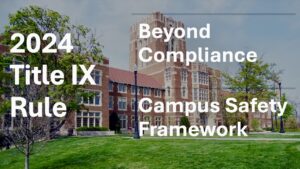 You’d think the 2024 Title IX Rule, due to take effect August 1, 2024, would use the most modern, inclusive definition of sexual assault available. You’d be wrong. You’d think it would be automatically compatible with the definition colleges and universities have to use under the Clery Act not only for statistical reporting but also for disciplinary proceedings. You’d be wrong.
You’d think the 2024 Title IX Rule, due to take effect August 1, 2024, would use the most modern, inclusive definition of sexual assault available. You’d be wrong. You’d think it would be automatically compatible with the definition colleges and universities have to use under the Clery Act not only for statistical reporting but also for disciplinary proceedings. You’d be wrong.
Are you confused? Don’t worry we’ll get you more or less on the right track (at least in our considered opinion). But first a bit of context.
The Rule, at 34 CFR § 106.2, defines sexual assault (which is prohibited sex-based harassment) as “an offense classified as a forcible or nonforcible sex offense under the uniform crime reporting system of the Federal Bureau of Investigation”. The FBI retired the terms “forcible” and “nonforcible” in 2013 in favor of more modern terminology that reflects a focus on whether or not there was consent. So the terms funding recipients are directed to use technically don’t even exist anymore.
Why would the U.S. Department of Education’s Office for Civil Rights (OCR) do this? Do this again actually as they also did it in 2020. According to the 2024 “preamble” it was “to maintain consistency with the statutory definition of sexual assault under the Clery Act.” Yes that statutory language, enacted in 1992, uses those terms (a 2013 amendment came before the changes to the FBI’s guidelines). In 2014, however, the Department’s Office of Postsecondary Education (OPE) updated Clery regulations to reflect the most modern, inclusive sexual assault definitions available under the FBI’s guidelines at the time.
 Fortunately it is this 2014 interpretation by OPE that puts us on what we believe is the best path forward, and for Title IV institutions of higher education the only path forward. Those institutions are already required to use the Clery definitions and other recipients may elect to use those definitions. The basis for these definitions is the underlying statutory language used by both the 2020 and 2024 Title IX Rules so it makes sense they can be used right?
Fortunately it is this 2014 interpretation by OPE that puts us on what we believe is the best path forward, and for Title IV institutions of higher education the only path forward. Those institutions are already required to use the Clery definitions and other recipients may elect to use those definitions. The basis for these definitions is the underlying statutory language used by both the 2020 and 2024 Title IX Rules so it makes sense they can be used right?
In response to a request for clarification about all this OCR wrote us on June 10th to explain “Nothing in the 2024 Title IX regulations prohibits a recipient, including a postsecondary institution, from using the definitions of sexual assault, including the definition of rape, fondling, incest, and statutory rape in Appendix A to the Clery Act regulations…under Title IX.” So indeed the answer is yes they may be used. These definitions may be found in Title 34 of the Code of Federal Regulations at Appendix A to Subpart D of Part 668.
It is also important to note that the Clery regulations prohibit use of the regressive, non-inclusive terms “sodomy” and “sexual assault with an object” that may be found in some other definitions of sexual assault from the FBI. What was covered by these terms is now part of a consolidated, inclusive, and gender-neutral definition of “rape” under Clery requirements.
Further, it is worth noting that use of these terms introduces elements of intent and consent into a civil-rights protection that has historically been based on unwelcomeness. The preamble addresses this stating “The Department also notes that unwelcome sex-based conduct that is severe or pervasive and meets the other elements of hostile environment sex-based harassment would constitute sex-based harassment under Title IX, that a single instance of sexual assault would likely meet the definition of hostile environment sex-based harassment”. In other words an alleged sexual assault could constitute prohibited sex-discrimination either under the express definition or under the “severe” standard that was previously used for decades.
If you’re still confused I certainly understand. If you have questions please e-mail them to me at info@safecampuses.biz.
This blog does not provide legal advice and does not create an attorney-client relationship. If you need legal advice, please contact an attorney directly.
